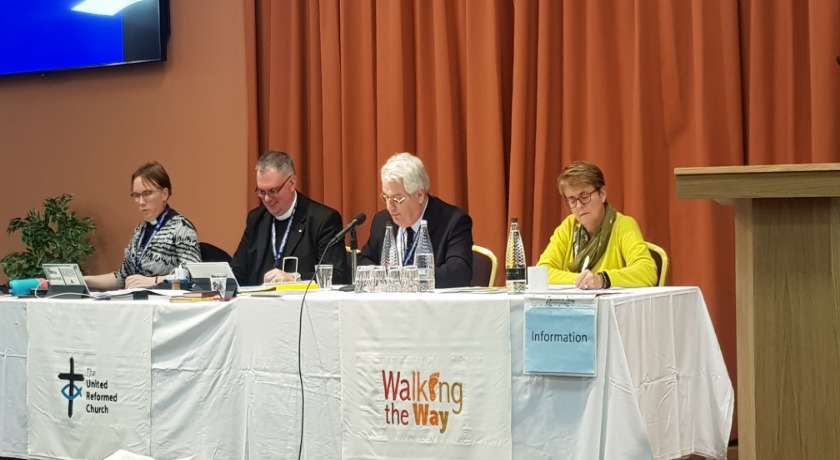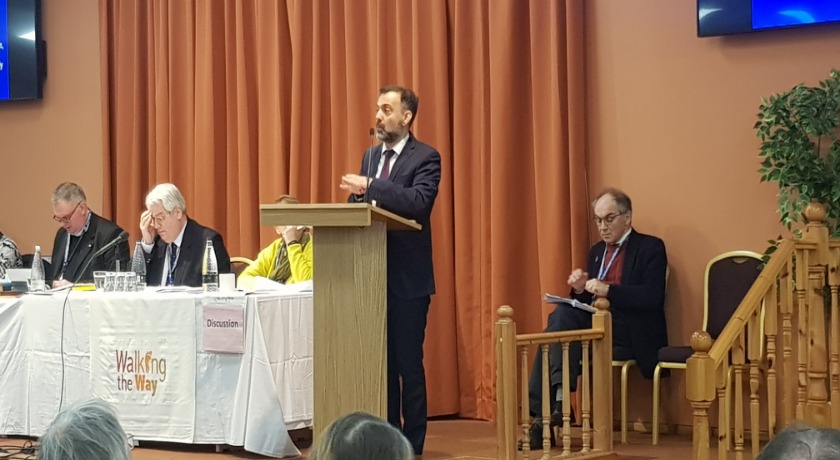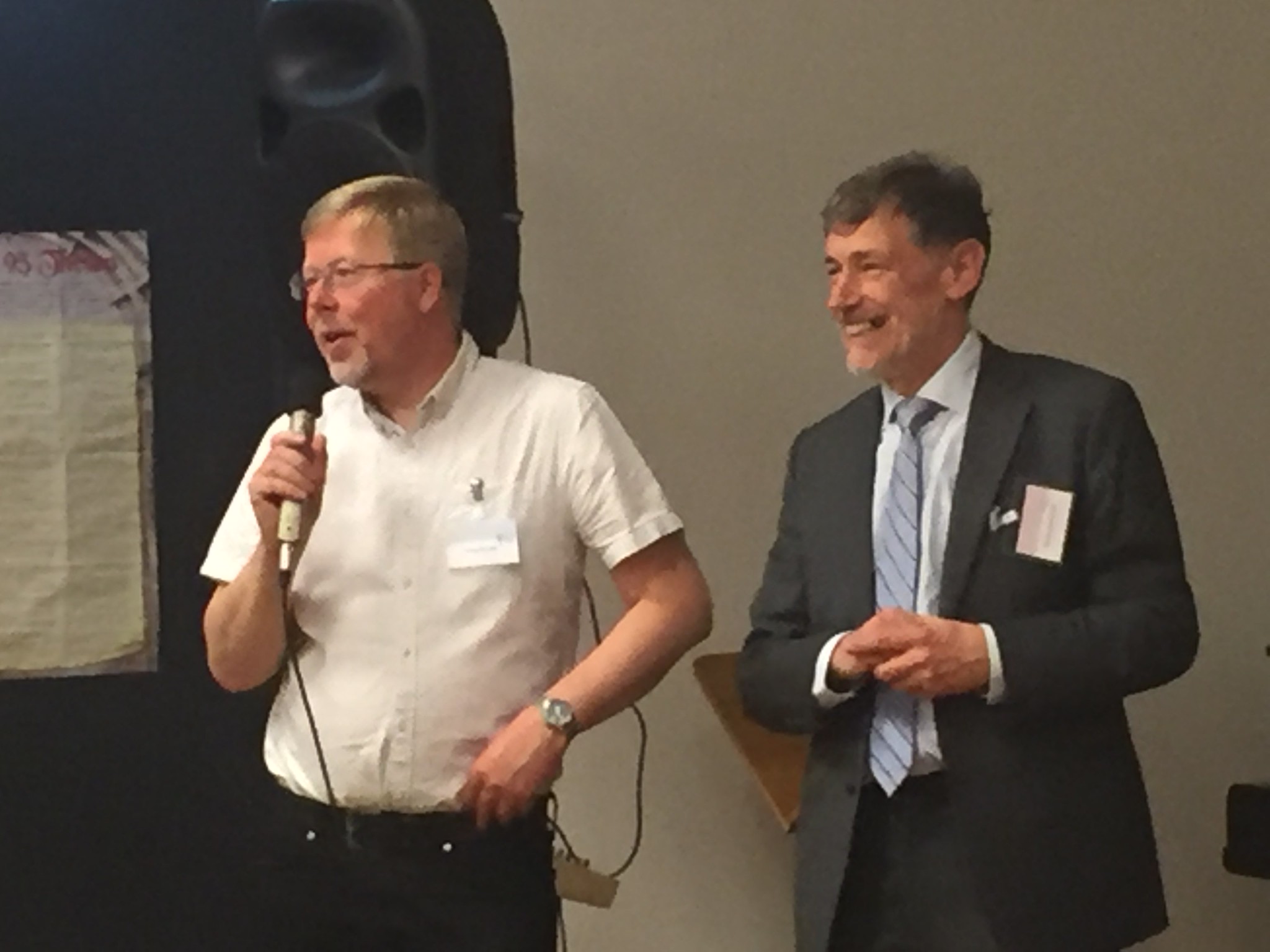 The second day of Mission Council began with worship led by the Revd David Coaker, Chaplain to the Moderator of General Assembly.
The second day of Mission Council began with worship led by the Revd David Coaker, Chaplain to the Moderator of General Assembly.
Dr Alison Gray, Tutor in Old Testament at Westminster College, Cambridge, led a second Bible study, looking at Proverbs 2 and Job 23. Continuing with the theme of pathway and refuge, Dr Gray reflected on the way Proverbs speaks of the wisdom of God’s way and echos the assurances of the Psalms that blessings come to those who follow it.
The story of Job, however, challenges that traditional understanding and rejects simple answers about the suffering of the righteous. And yet it also shows Job finding comfort in God’s presence. Dr Gray reflected upon Vittore Carpaccio’s painting The Meditation on the Passion, which invites us to see Christ entering into Job’s suffering. John’s gospel, like the Psalms, assures us that there is joy to be found in walking the way, however much suffering there may be there.
Session four
Alan Yates, Immediate-past Moderator of the General Assembly, took to the podium in session four of Mission Council and announced that the Revd Fiona Thomas, URC Secretary of Education and Learning, has handed in her resignation. He advised that Revd Thomas informed that as she had reached a benchmark age, she had decided to pursue other avenues that includes exploring ministries and freelance work in Appreciative Inquiry.
Mr Yates then continued Paper I1: Legacies of Slaveries, which was first introduced in session three on day one of Mission Council. He asked members to focus on the three questions designated to their particular groups, explaining that groups A, B, and C would be exploring an apology. Groups D, E, and F would be addressing questions about reparation, and groups G and H would be exploring white privilege.
He advised that those tasked with recording discussions would need to provide a provide a paper or email copy of the outcome of groupwork discussions to Mr Yates, who hopes to give some feedback on day three of Mission Council.
Session five
 R2 – URC’s Safeguarding strategic plan 2020-2025
R2 – URC’s Safeguarding strategic plan 2020-2025
Having already accepted the recommendations of the Past Case Review (PCR) Learning Group Report, Mission Council, acting on behalf of General Assembly, endorsed the URC’s safeguarding strategic plan. The Safeguarding Advisory Group reviewed all the PCR Learning Report's recommendations and consulted with Synods in producing the plan.
The PCR indicated the need for the Church to undertake systemic changes. The strategy’s six, clear, objectives aim to effect cultural change and improvements in the safeguarding policies, practices and procedures of the Church over the next five years.
“Safeguarding people is a journey and part of the URC’s mission. We journey alongside those who have been abused, we safeguard the integrity of creation, and we all go together as one body,” the report said.
Mission Council also directed the Safeguarding Advisory Group to oversee the development, implementation, review and monitoring of the plan, and to advise the Mission Council and the General Assembly on its progress.
- When reviewing the plan in the summer, the URC was granted core participant status for IICSA’s investigation into child protection in religious organisations and settings in England and Wales. The URC as a core participant was made on the basis that the Church has played a direct and significant role in relation to its recent Past Case Review.
- The report also mentioned that the Church has also received a request from, and submitted evidence to, the All Party Parliamentary Group on Safeguarding in Faith Settings inquiry.
- The next edition of URC’s safeguarding policy - Good Practice 5: Safeguarding for Children and Adults at Risk will be ready in January 2020 to reflect new laws and regulatory requirements.
- A framework of safeguarding training continues to be developed, and the Safeguarding Advisory Group is liaising to the Ministerial Incapacity and Discipline Advisory Group to ensure a joined-up and consistent approach between safeguarding and discipline.
- A Safeguarding Programme Officer will be employed to work with the National Safeguarding Adviser to help synods implement the plan over the next three years.
The resolution was agreed after the Inter-Synod Resource Sharing Group promised to look at helping Synods that had expressed concern over the resources needed to fully implement the plan.
R1 – Safeguarding Advisory Group
On behalf of the United Reformed Church, Mission Council thanked survivors of abuse for their courage in sharing their thoughts and recommendations.
On behalf of the General Assembly, Mission Council further instructed the Safeguarding Advisory Group to oversee and support the work of the survivors’ group; integrate their recommendations in the delivery of URC’s Safeguarding Strategic Plan (2020-2025); review and advise the whole Church through Mission Council/General Assembly on how to continue fostering this sensitive area of pastoral care and support for adult survivors of abuse.
Two of the Past Case Review’s (PCR) recommendations referred to the need to instigate direct work with adult survivors of abuse and consultation with survivors and relevant organisations about ways to improve safeguarding in the URC.
Meetings with survivors and pastors took place which identified the following elements in supporting adult survivors of abuse:
- to establish a culture at the URC where people feel safe to speak about abuse
- the need to use the term survivors, not victims of abuse
- to use currently available resources of the URC: new theological resources, prayers, leaflets, brochures and campaigns, new material for local churches to make people aware of the issues surrounding safeguarding adults
- the production of a URC prompt card specifying procedures for reporting abuse
- the recognition that child protection arrangements are more established in the Church but that safeguarding of adults requires further work
- a whistleblowing policy that would enable complainants to make statements that are taken seriously and responded to appropriately
- the need to be better at listening and to have people ready to listen. The Church has found it difficult to listen when experiences of abuse are disclosed, and anger is expressed
- the need for an unbiased support system imbedded within the life of the URC that seeks resolutions and access to right support
- the need to be aware of cases that don’t “fit” some definitions and to be flexible in the way we offer support over time
- the need for pastoral support at local churches
- to effect positive change and feed into the wider work and ethos of the URC
- work to help the Church take a standpoint about spiritual abuse.
Session seven
En bloc resolutions
The following resolutions were passed en bloc. En bloc resolutions are voted on without debate, having been deemed uncontroversial. This has no reflection on their importance.
A1 Assembly arrangements
A brief report on bookings and other arrangements made for the 2020 General Assembly in Birmingham
G2 Ethical investment
A brief report from the finance committee on progress in divesting from fossil fuel companies as resolved by Mission Council in 2019. It is ahead of schedule thanks to CCLA’s subsequent decision to divest. Appended are updated versions of the URC’s ethical investment guidelines.
H1 New sub-committee of ministries committee
This effectively amalgamates the accreditation subcommittee and the Church Related Community Work programme subcommittee.
H2 Ministers on more than one roll
This clarifies the rule that a minister cannot normally be on the rolls of the URC and another denomination at the same, and what the exceptions are.
I2 Mission committee update
A report on the recent work of the Mission Committee. Mission Council agrees to an enlargement of the environmental task group and asks all synods and Assembly committees to report to this group about their progress in implementing the Environmental Policy by 29 February 2020.
I3 Walking the Way update
A report on the work of the steering group, asking Mission Council to consider its future.
J1 List of nominations
Mission Council agrees amendments to the nominations list of May 2019, as well as new appointments and reappointments.
O1, O2, O3 Human resources advisory group
O1 is a report on recent work of the group
 Paper I4: Fall of the Wall Conference
Paper I4: Fall of the Wall Conference
With emergency resolution I4, Mission Council commended the declaration agreed between the United Reformed Church and the Evangelische Kirche der Pfalz for consideration by its partners in Europe, and instructed those who represent the URC to bring it to their attention.
The declaration was written as part of a gathering of more than 50 members, ministers, staff and leaders of the United Reformed Church and the Evangelische Kirche der Pfalz, who met to mark the 30th anniversary of the fall of the Berlin Wall. The meeting, which took place in Frankenthal, Germany, looked at physical and psychological walls being built today, and how they can be overcome or prevented.
The two churches have been in partnership since 1957.
On 9 November, the day marking 30 years since the fall of the Berlin Wall, 29 years since the reunification of Germany, and the 81 years since Kristallnacht, Nigel Uden from the United Reformed Church and Manfred Sutter from the Evangelische Kirche der Pfalz signed a statement that acknowledged, with sadness, that around the world, physical and imagined walls are once again being built.
It declared that: differences of opinion, culture, faith and conviction are treated with respect; that we all speak out against racism in all forms and report all incidents; that we underline our commitment against anti-semitism and any form of religious hatred; that refugees are not used as scapegoats but rather seen as those who enrich communities; that we strive for unity lived out in our churches as an example for our societies; that we recommit ourselves to the spirit of the first Covenant of fellowship signed in 1957.
The group then took part in an act of worship with communion spoken and sung in German and English at the Lutherkirche in Frankenthal.
Read the declaration in full
Visit the Flickr gallery with photos and videos from the Fall of the Wall Conference
As a result, on Saturday afternoon, the Revd James Breslin brought an additional resolution, which he said was open-ended rather than trying to list all the partner churches which had been suggested.
The resolution was passed by Mission Council, as follows:
Mission Council commends the November 2019 declaration agreed between the United Reformed Church and the Evangelische Kirche der Pfalz for consideration by its confessional and ecumenical partners in Europe, and instructs those who represent the URC thereon to bring it to their attention.
Pictured: The Revd Philip Brooks and Pfarrer Martin Henninger, Minister of the Lutherkirche in Frankenthal, celebrating the 30th anniversary of the fall of the Berlin Wall in Germany. Martin served Broadway URC, Worcestershire in the early 1990s.
Paper H3: Pastoral supervision
The Revd Paul Whittle, Moderator of the United Reformed Church Eastern synod, presented paper H3 on the pastoral supervision of ministers, on behalf of the ministries committee. He explained that its recommendations grew out of the past case review, and that the requirement to consider pastoral supervision was accepted by Mission Council when it accepted the past case review.
The paper makes eight propositions for the supervision of ministers. He said that the work was far from complete and asked members to discuss the propositions in groups, paying particular attention to numbers five to eight.
Feedback from discussion groups included:
- Any reporting – beyond the fact of the supervision happening and safeguarding matters – would prevent good supervision and probably be rejected by potential supervisors. The session should be a safe space.
- Peer group supervision would generally be the best approach, though not for everyone.
- Others were less keen on group supervision.
- The ‘specified exceptions’ to confidentiality in para 25 should be specified!
- A variety of internal URC and external supervisors would be needed.
- Peer group supervision would also be valuable for elders.
- A traffic light system of reporting could give Moderators the minimum of information but allow them to decide whether it was necessary to follow up.
- Supervision systems and standards should be consistent across the synods.
- The system should be set up to be sustainable.
- Funding should be centralised in order to avoid local provision becoming a lottery.
- It should be brought in for everyone at once, otherwise self-selection could mean who would most benefit from supervision miss out.
- Those who are already having monthly support sessions would miss out if they now started to have less frequent supervision.
- Supervision and support are not the same.
- How transparent will the process be? Will records be held? If so, where and who will have access to them?
- Supervision should highlight ministers’ further training needs.




